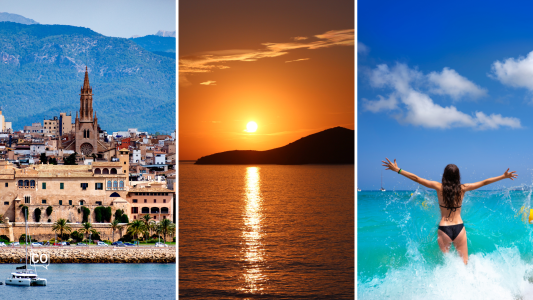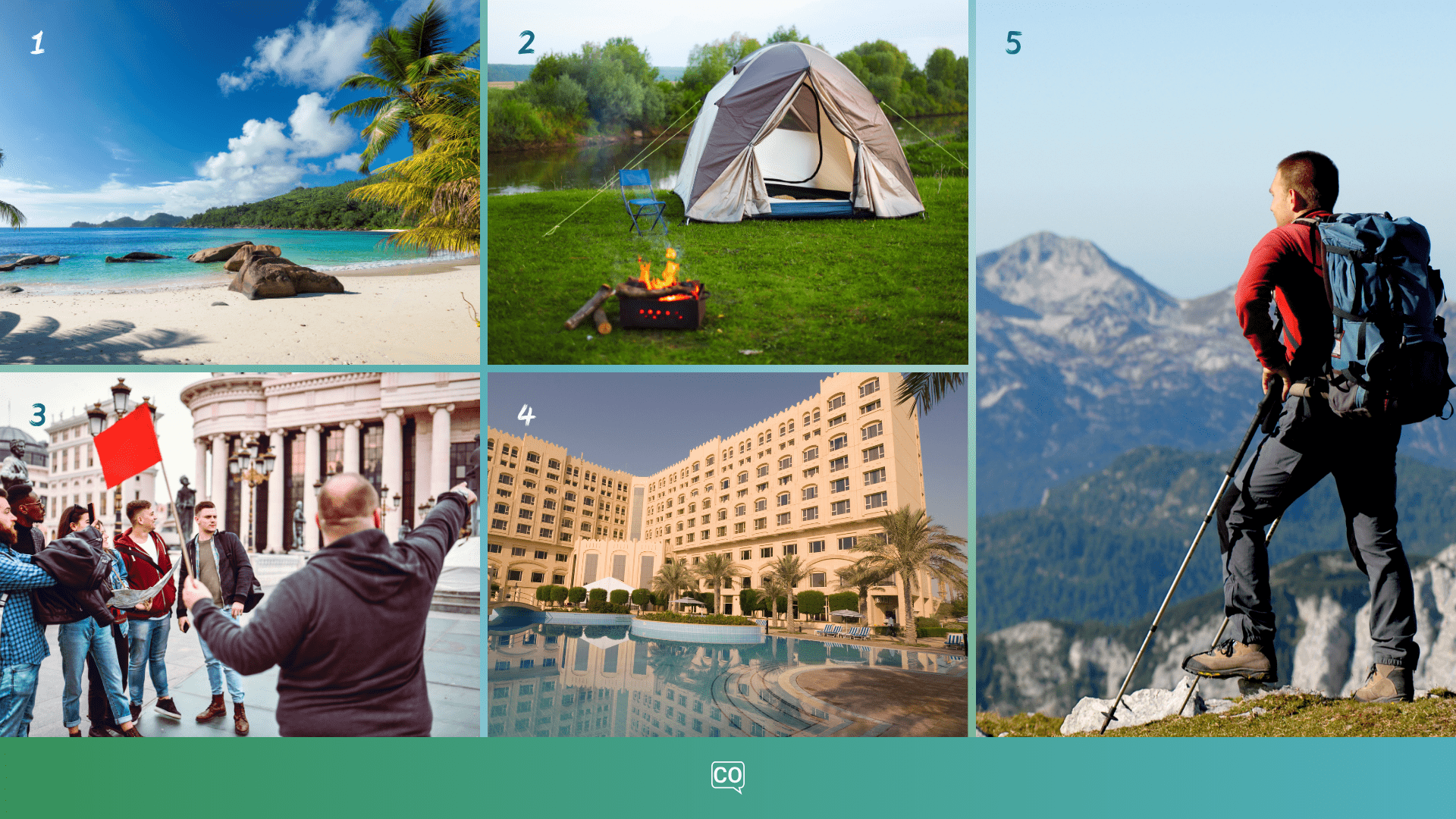Planes de vacaciones

Learning goals:
- Describe tus planes para las vacaciones (Describe your holiday plans)
- Vocabulario de viaje (Travel vocabulary)
-
Preposiciones:
"desde" y"hasta" (Prepositions: "desde" and "hasta") -
Viajar a las Islas Baleares:
Mallorca e Ibiza (Travel to the Balearic Islands: Mallorca and Ibiza)
Learning module 1 (A2): Viajar: ¡A lo desconocido! (Travelling: into the wild!)
Teaching guidelines +/- 60 minutes
Core vocabulary (12)
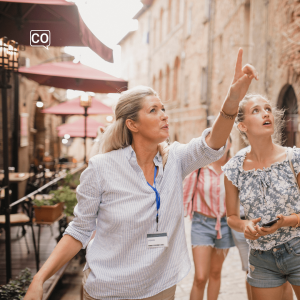
La guía turística es muy amable.
(The tour guide is very friendly.)
El guía turístico
(The tour guide)

El vuelo desde Madrid hasta Roma fue relajado.
(The flight from Madrid to Rome was relaxing.)
El vuelo
(The flight)

Vamos a disfrutar de la excursión.
(We are going to enjoy the excursion.)
La excursión
(The excursion)
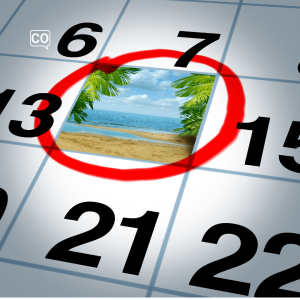
Tengo planes de viajar desde Madrid hasta Barcelona.
(I have plans to travel from Madrid to Barcelona.)
Tener planes
(To have plans)
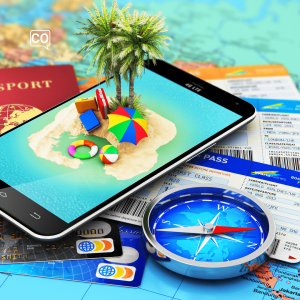
Vamos a la oficina de turismo desde la agencia de viajes para comprar un billete.
(Let's go to the tourism office from the travel agency to buy a ticket.)
La oficina de turismo
(The tourism office)

La turista está relajada desde que tuvo planes para el viaje.
(The tourist has been relaxed since she made plans for the trip.)
Relajado
(Relaxed)

El turista habló con el guía turístico sobre el viaje.
(The tourist spoke with the tour guide about the journey.)
El viaje
(The journey)

Desde la agencia de viajes, puedes comprar un billete para el vuelo.
(From the travel agency, you can buy a ticket for the flight.)
La agencia de viajes
(The travel agency)
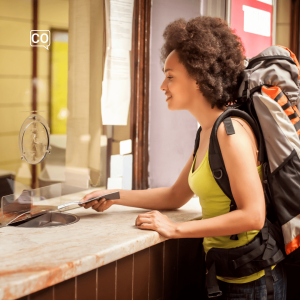
Voy a la oficina de turismo para comprar un billete desde Madrid hasta Barcelona.
(I am going to the tourist office to buy a ticket from Madrid to Barcelona.)
Comprar un billete
(Buy a ticket)
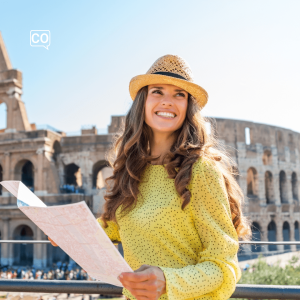
El turista compra un billete en la agencia de viajes.
(The tourist buys a ticket at the travel agency.)
El turista
(The tourist)
Listening materials
Our listening materials implement the verbs, vocabulary and grammar topics of this lesson. Audio and video available!
A2.1.1 Diálogo: ¿A dónde viajas estas vacaciones?
Spanish A2.1.1 Where are you travelling to this holiday?
Un diálogo corto en español sobre los planes de vacaciones.
(A short dialogue in Spanish about holiday plans.)
Teaching guidelines +/- 15 minutes
A2.1.2 Gramática: Preposiciones: "desde" y "hasta"
Spanish A2.1.2 Prepositions: "desde" and "hasta"
(The prepositions "desde" and "hasta" indicate the point where an action, a place, or a period of time begins or ends.)
Teaching guidelines +/- 15 minutes
A2.1.3 Cuento corto: Luis viaja a Mallorca.
Spanish A2.1.3 Luis travels to Mallorca.
Un cuento corto sobre Luis, un turista, que hace un viaje a otra cuidad en España.
(A short story about Luis, a tourist, who takes a trip to another city in Spain.)
Teaching guidelines +/- 15 minutes
A2.1.4 Cultura: Viajar a las Islas Baleares: Mallorca e Ibiza
Spanish A2.1.4 Travel to the Balearic Islands: Mallorca and Ibiza
Descubre las islas populares
(Discover the popular islands Mallorca and Ibiza. A perfect destination to enjoy from sunrise to sunset.)
Teaching guidelines +/- 10 minutes
Exercises
These exercises can be done together during conversation lessons or as homework.
Exercise 1: Find the words
Instruction: Find the words, mark them and make sentences with the words.
Show answers Show hintsHints
Relaxed , To travel , To have plans , The excursion , The flight , The journey
Answers
Score: 0/6
| El vuelo | (The flight) |
| Relajado | (Relaxed) |
| La excursión | (The excursion) |
| Tener planes | (To have plans) |
| Viajar | (To travel) |
| El viaje | (The journey) |
Exercise 2: Reorder sentences
Instruction: The words in these sentences have been shuffled! Sort them so that they make a valid sentence again and translate.
Show answers Show translationExercise 3: Translate and make sentences
Instruction: Translate the words and phrases below and use it in a conversation or text.
Show answersExercise 4: Translate and use in a sentence
Instruction: Translate and say the word out loud. Use the word in a sentence.
Show translation|
1.
El turista
|
(The tourist) |
|
2.
Viajar
|
(To travel) |
|
3.
Relajado
|
(Relaxed) |
|
4.
El viaje
|
(The journey) |
|
5.
La excursión
|
(The excursion) |
Exercise 5: Conjugación verbal
Instruction: Choose the correct word, read the sentence out loud and translate.
Show answers Show translationQuedar (Pretérito perfecto, indicativo), Ir (Pretérito perfecto, indicativo)
1. Yo ... con mis amigos en el parque.
2. Hoy yo ... al supermercado.
3. Nosotros ... a la playa este fin de semana.
4. Él ... con su novia esta tarde.
5. ¿Vosotros ... al cine anoche?
Exercise 6: Prepositions: "desde" and "hasta"
Instruction: Choose the correct word, read the sentence out loud and translate.
Show answers Show translationhasta, desde
1. Punto de inicio: Me siento relajado ... que llegamos al hotel.
2. Punto de inicio: He quedado con Laura ... las ocho de la mañana.
3. Punto final: He reservado un vuelo desde Barcelona ... París.
4. Punto final: La agencia de viajes organiza todo desde la compra de los billetes ... las excursiones.
5. Punto de inicio: Viajo ... Sevilla hasta Madrid todos los fines de semana.
6. Punto final: Estoy de vacaciones en Roma ... el domingo.
7. Punto de inicio: El guía turístico nos acompaña ... el hotel hasta el parque.
8. Punto de inicio: Él ha reservado su vuelo ... la agencia de viajes.
Exercise 7: Translate and make sentences
Instruction: Translate the words and phrases below and use it in a conversation or text.
Show answersConversation exercise
Teaching guidelines +/- 10 minutes
- Cada uno de los estudiantes elige una opción de vacaciones. Imagina que estás planeando ir allí. Pregúntense y respondan las preguntas: (Each of the students picks one holiday option. Imagine you are planning to go there. Ask each other and answer the questions: )
- ¿Cuáles son tus planes para las vacaciones? (What are your holiday plans? )
- ¿Cuándo sale tu vuelo y desde dónde? (When does your flight leave and from where?)
- ¿Has viajado a la playa o a la montaña? (Have you travelled to the beach or the mountains?)
Example phrases:
- Estudiante A: ¿Cuáles son tus planes para las vacaciones? Estudiante B: Tengo un vuelo a un destino de la foto número 1. ¿Y tú? Estudiante A: Voy de excursión a la montaña. (Student A: What are your holiday plans? Student B: I have a flight to a destination from picture number 1. And you? Student A: I am going on an excursion in the mountains)
- ...
Appendix 1: Extended vocabulary table
Core vocabulary
(12):
Verbs: 2,
Adjectives: 1,
Nouns: 7,
Sentences / word combination: 2
Context vocabulary:
11
| Spanish | English |
|---|---|
| Agencias de viajes | Travel agencies |
| Compran un billete | They buy a ticket |
| Comprar un billete | Buy a ticket |
| El guía turístico | The tour guide |
| El turista | The tourist |
| El viaje | The journey |
| El vuelo | The flight |
| Excursiones guiadas | Guided tours |
| Hacen una excursión | Take a trip |
| He comprado un billete | I have bought a ticket |
| La agencia de viajes | The travel agency |
| La excursión | The excursion |
| La oficina de turismo | The tourism office |
| Lugares turísticos | Tourist destinations |
| Relajado | Relaxed |
| Relajarse | To relax |
| Tener planes | To have plans |
| Tiene planes | He has plans |
| Tienes planes | Do you have plans |
| Turistas | Tourists |
| Viaja | He travels |
| Viajar | To travel |
| Visitar | To visit |
Appendix 2: Verb conjugation tables for this lesson
Quedar (to meet)
Exercises and examples phrases
- yo he quedado I have met
- tú has quedado You have met
- él/ella ha quedado he has met
- nosotros/nosotras hemos quedado we have met
- vosotros/vosotras habéis quedado You have met
- ellos/ellas han quedado They have met
Ir (to go)
Exercises and examples phrases
- yo he ido I have gone
- tú has ido You have gone
- él/ella ha ido he has gone
- nosotros/nosotras hemos ido We have gone
- vosotros/vosotras habéis ido you have gone
- ellos/ellas han ido They have gone
Exercise: Verb conjugation
Instruction: Choose the correct word, read the sentence out loud and translate.
Show answers Show translationQuedar (Pretérito perfecto, indicativo), Ir (Pretérito perfecto, indicativo)
1. Yo ... con mis amigos en el parque.
2. Hoy yo ... al supermercado.
3. Nosotros ... a la playa este fin de semana.
4. Él ... con su novia esta tarde.
5. ¿Vosotros ... al cine anoche?




